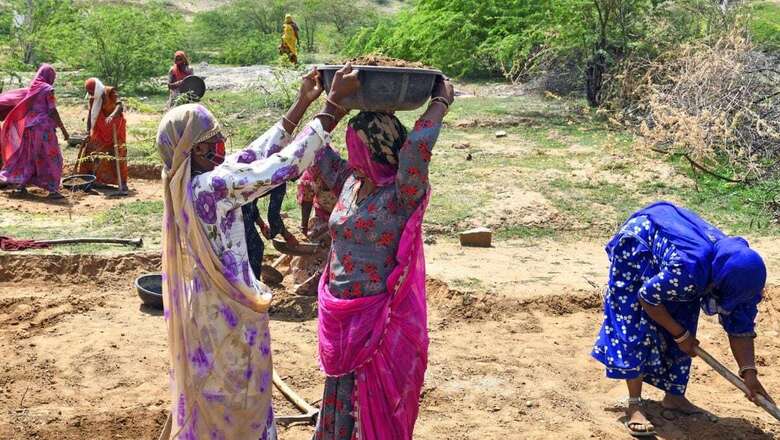
views
The Centre may consider “exemption” on the so far mandatory Aadhaar-enabled wage payments on a “case to case” basis for those working under its flagship rural employment guarantee scheme, the union ministry for rural development (MoRD) announced late on Monday evening.
The move comes after the opposition panned the government over the mandatory Aadhaar-Based Payment System (ABPS) for transferring wages to workers under the Mahatma Gandhi National Rural Employment Guarantee Scheme (MGNREGS) as the latest deadline for states to completely switch to this mode of payment got over on December 31. This requires workers’ Aadhaar details to be seeded to their job cards.
The government did not exceed the deadline as on January 1.
The Centre had in January 2023 mandated that all wage payments under the scheme will have to be done through ABPS and has since run out of five deadlines for all states to complete Aadhaar-eligibility for all its registered and active workers.
Calling it a “cruel New Year gift”, the Congress on Monday said the BJP-ruled Centre was “weaponising technology” to deny workers their social welfare benefits.
Senior Congress leader and party’s general secretary (communications) Jairam Ramesh said, “The Modi government should stop weaponising technology, especially Aadhaar to deny the most vulnerable Indians their social welfare benefits, release delayed wage payments and implement open muster rolls and social audits to improve transparency.”
Reacting to this, the MoRD in a statement released late evening said: “In case, if any Gram Panchayat of a district in the state is having either technical problem or Aadhaar related problem, the government may consider exemption from APBS on case to case basis till the resolution of the issue.”
The ministry also said that MGNREGS is a demand-driven scheme and is affected by various economic factors.
As per data shared by the MoRD, the total number of registered job cards is 14.32 crore, out of which 9.77 crore (68.22%) are active. There are a total of 25.25 crore workers, out of which just 14.32 crore (56.83%) are active workers.
“Out of the total 14.32 crore active workers, Aadhaar seeding of 14.08 crore (98.31%) active workers have already been completed. Against these seeded Aadhaar, a total 13.76 crore Aadhaar have been authenticated and 87.52% active workers are now eligible for APBS,” the ministry said.
NPCI data shows that there is a higher success percentage to the extent of 99.55% or above where the Aadhaar is enabled for DBT. In the case of account-based payment such success is about 98%.
In a working paper released by public research and advocacy group LibTech, it has been referred to and according to this, it is claimed by some of the researchers that there is no significant gain with ABPS vis-à-vis bank account payments and it is just 3% more in case of ABPS. It needs further clarification that keeping the scale of Mahatma Gandhi NREGS in view, this 3% gain is also very significant. This research by LibTech endorsed that the ABPS process is resulting in the favour of better implementation leading to greater transparency.
A recent research paper released by LibTech — a public research and advocacy group — working on MGNREGS implementation stated that there is no significant gain with ABPS vis-à-vis bank account payments and it is just 3% more in the case of ABPS.
Reacting to the research paper, the MoRD said that keeping the scale of MGNREGS in view, even this 3% gain is significant.
“NPCI data shows that there is a higher success percentage to the extent of 99.55% or above where the Aadhaar is enabled for Direct Benefit Transfer (DBT). In the case of account-based payment such success is about 98%,” the statement read.
According to the ministry, from April 2022 to till date about 2.85 crore job cards have been deleted by “following the due process by the states”.
The deletion of job cards in 2022 saw an increase of 247%, the highest ever, as per a response stated by MoRD in Parliament.


















Comments
0 comment